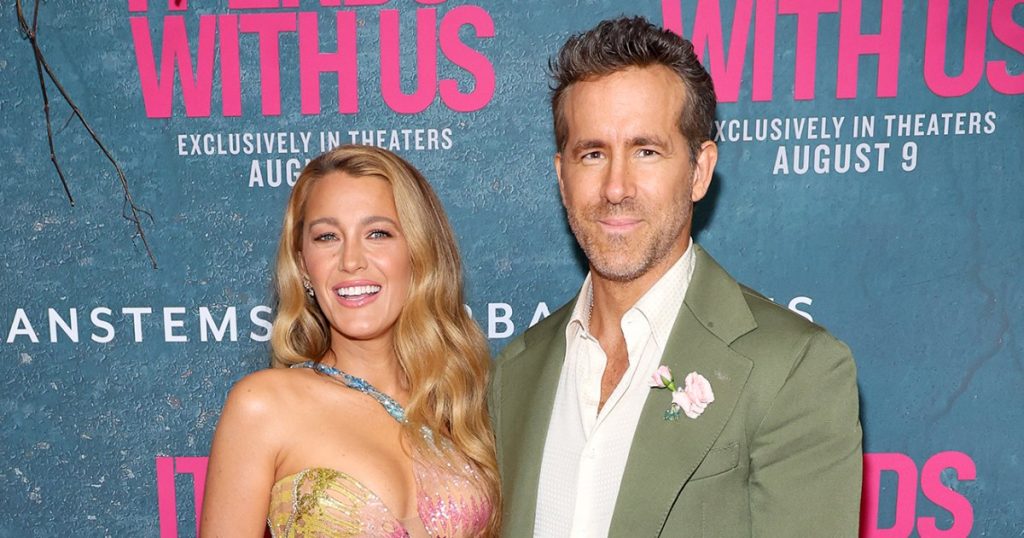Ryan Reynolds and Blake Lively, two prominent figures in Hollywood, are dedicated to providing their four children—James, Inez, Betty, and their youngest son, Olin—with a childhood as normal as possible, despite their own high-profile lives. This commitment stems from a conscious effort to shield their children from the stark contrasts between their privileged upbringing and the working-class backgrounds that both Reynolds and Lively experienced. Reynolds acknowledges the temptation to compare his children’s lives to his own, recognizing the numerous advantages they have, but he consciously refrains from imposing this comparison on them. He understands that their circumstances are different, and burdening them with an awareness of this difference isn’t beneficial. Instead, he and Lively focus on instilling values of gratitude and empathy, striving to raise children who are aware of their privilege and possess a strong sense of compassion for others.
Reynolds emphasizes the importance of empathy as a key indicator of their parenting success. He believes that if their children can understand and share the feelings of others, particularly those less fortunate, then they’re on the right track. While acknowledging the inherent differences between his childhood and his children’s, he expresses relief that his children won’t experience the same kind of unsupervised freedom he had growing up. Reynolds recalls a time when children were expected to simply “suck it up” and entertain themselves outdoors until dusk, a concept that seems almost foreign in today’s world. This shift in parenting styles reflects a broader societal change, where constant stimulation and structured activities have become the norm.
Beyond their parenting philosophy, Reynolds also discusses his decision to take a break from filming. This pause, however, doesn’t translate to complete inactivity. He clarifies that he’s still actively engaged in creative pursuits, primarily writing, working on projects like “Boy Band” and other ventures he’s not yet ready to disclose. Reynolds doesn’t subscribe to the notion that idle hands lead to trouble. He doesn’t crave constant work and values the importance of boredom, a state of mind he believes is often undervalued in contemporary society. He argues that the constant barrage of entertainment we subject ourselves to stifles creativity and prevents the mind from wandering and generating new ideas. For Reynolds, boredom is a breeding ground for inspiration, a state where the mind can roam freely and discover unexpected insights.
Reynolds’ perspective on parenting and work reveals a thoughtful approach to balancing the demands of a high-profile career with the desire to raise grounded and empathetic children. He and Lively are navigating the complexities of raising a family in the public eye, consciously choosing to prioritize their children’s well-being over the allure of Hollywood excess. Their focus on instilling values of gratitude and empathy, combined with their appreciation for the benefits of boredom, suggests a deliberate effort to create a nurturing and balanced environment for their children. This conscious parenting style, coupled with Reynolds’ own embrace of downtime for creative renewal, paints a picture of a family that values both personal growth and meaningful connections.
This approach to parenting stands in contrast to the often-glamorized portrayal of celebrity families. Reynolds and Lively are actively choosing to shield their children from the pressures and excesses of their industry, emphasizing the importance of ordinary experiences and the development of essential character traits. Their commitment to normalcy is not about denying their children the privileges they have, but rather about fostering an appreciation for those privileges and a deep understanding of the world beyond their own privileged bubble. This commitment to fostering empathy and gratitude in their children reflects a broader understanding of the responsibilities that come with privilege.
Reynolds’ emphasis on boredom as a catalyst for creativity further underscores his unconventional approach to both work and life. In a world obsessed with constant productivity and stimulation, he recognizes the value of allowing the mind to wander and explore uncharted territories. This perspective highlights a deeper understanding of the creative process, one that values introspection and the quiet contemplation that often leads to breakthroughs. It also speaks to a larger philosophy of prioritizing well-being and mental space over the relentless pursuit of external validation or achievement. By embracing boredom, Reynolds is not only nurturing his own creativity but also modeling for his children the importance of disconnecting from the constant noise of modern life and finding solace in quiet reflection.
In essence, Ryan Reynolds and Blake Lively are crafting a family life that prioritizes values over visibility, emphasizing the importance of raising children who are not only aware of their privilege but also deeply connected to the world around them. Their commitment to fostering empathy, gratitude, and a healthy respect for boredom stands as a testament to their conscious parenting style and their desire to create a nurturing environment that allows their children to thrive both personally and creatively. This approach, grounded in their own working-class roots, offers a refreshing perspective on parenting in the spotlight, demonstrating that fame and fortune need not overshadow the fundamental values of empathy, gratitude, and the simple joys of a “normal” childhood.

